I was playing with delegates and noticed that when I create a Func<int,int,int> like the example below:
Func<int, int, int> func1 = (x, y) => x * y;
The signature of the compiler generated method is not what I expected:

As you can see it takes an object for it's first parameter. But when there is a closure:
int z = 10;
Func<int, int, int> func1 = (x, y) => x * y * z;
Everything works as expected:

This is the IL code for the method with extra parameter:
.method private hidebysig static int32 '<Main>b__0'(object A_0,
int32 x,
int32 y) cil managed
{
.custom instance void [mscorlib]System.Runtime.CompilerServices.CompilerGeneratedAttribute::.ctor() = ( 01 00 00 00 )
// Code size 8 (0x8)
.maxstack 2
.locals init ([0] int32 V_0)
IL_0000: ldarg.1
IL_0001: ldarg.2
IL_0002: mul
IL_0003: stloc.0
IL_0004: br.s IL_0006
IL_0006: ldloc.0
IL_0007: ret
} // end of method Program::'<Main>b__0'
It seems that the parameter A_0 is not even used. So, what is the purpose of the object parameter in the first case? Why isn't it added when there is a closure?
Note: If you have a better idea for the title please feel free to edit.
Note 2: I compiled the first code in both Debug and Release modes, there was no difference. But I compiled second in Debug mode to get a closure behaviour since it optimizes the local variable in Release mode.
Note 3: I'm using Visual Studio 2014 CTP.
Edit: This is the generated code for Main in the first case:
.method private hidebysig static void Main(string[] args) cil managed
{
.entrypoint
// Code size 30 (0x1e)
.maxstack 2
.locals init ([0] class [mscorlib]System.Func`3<int32,int32,int32> func1)
IL_0000: nop
IL_0001: ldsfld class [mscorlib]System.Func`3<int32,int32,int32> ConsoleApplication9.Program::'CS$<>9__CachedAnonymousMethodDelegate1'
IL_0006: dup
IL_0007: brtrue.s IL_001c
IL_0009: pop
IL_000a: ldnull
IL_000b: ldftn int32 ConsoleApplication9.Program::'<Main>b__0'(object,
int32,
int32)
IL_0011: newobj instance void class [mscorlib]System.Func`3<int32,int32,int32>::.ctor(object,
native int)
IL_0016: dup
IL_0017: stsfld class [mscorlib]System.Func`3<int32,int32,int32> ConsoleApplication9.Program::'CS$<>9__CachedAnonymousMethodDelegate1'
IL_001c: stloc.0
IL_001d: ret
} // end of method Program::Main